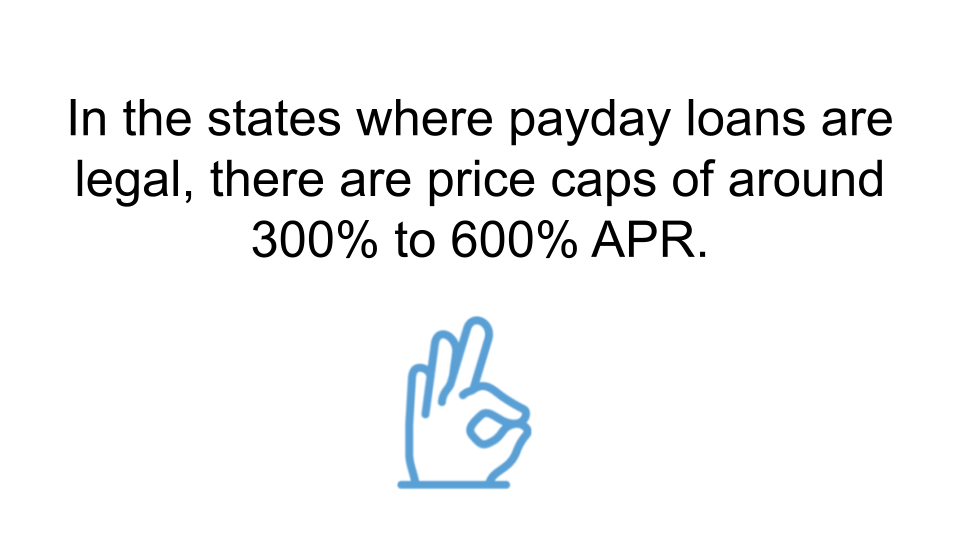Payday loan rates in the US vary by lenders, as well as between states. This means that there is not a set rate charged on top of payday loans in the US.
What are Payday Loans?
Payday loans are short-term, high-interest monetary loans and take place between a lender and a borrower. This usually occurs when the borrower is unable to seek this amount from banks or credit unions.
The majority of payday lenders charge very high interest rates, and in some US states, the interest rate that they charge is not regulated.
Typically, there is a strict time period in which you are expected to pay back the loan. This lies between around 14 to 28 days.
If you are unable to pay back the loan on time, then you will be charged high interest rates until it is paid back, which can lead to spiraling debt in some instances.
As such, you should only resort to using payday loans in financial emergencies, such as to fund unexpected home repairs or medical bills.
What Rates are Charged by Payday Loan Lenders?
Payday loan lenders will charge an annual percentage rate on top of the money that they lend to a prospective borrower. The annual percentage rate determines the yearly interest rate that will be charged, but for payday loans, this rate is actually partially determined by US state-level restrictions. Some US states may have a cap on the interest that can be charged by payday loan lenders, while others may not have any cap at all on this.
Do Payday Loan Rates Vary From State to State?
Payday loans are currently regulated on a state-by-state basis with a price cap. There are currently 12 states across the United States where payday loans are illegal. This does not include a number of states who operate with particular legal restrictions concerning payday loans.
In the states where payday loans are legal, there are price caps of around 300% to 600% APR. In those where it is not legal, there are price caps at 36% APR maximum.
In these states, the payday loan lenders are able to charge what they please. For instance, in Texas, interest rates could reach as high as 662% on every $300 borrowed. If the borrower is unable to pay back the original amount on their due date, which applies to many vulnerable borrowers, then the interest will climb and could result in them paying back triple the amount that they had originally borrowed.
In 2021, five more US states, Minnesota, Tennessee, Illinois, Virginia and Indiana implemented interest rate price caps.

Why Are Payday Loan Rates So High?
Payday loan lenders typically claim that they charge high rates because of the high risks involved with payday loan lending. There is an increased risk compared to alternatives such as credit card applications as often for payday loans, the prospective borrower needs to provide very little information and may even have a poor credit score, indicating that they are unlikely to repay the funds in full and on time.
As such, unlike banks or credit unions who may provide their customers with credit cards, payday loan lenders do not have this additional security that their prospective borrowers will repay the funds back. Furthermore, with payday loans, no collateral needs to be declared, making it serve as a greater risk for the lenders involved.
What are the Alternatives to Payday Loans?
Payday loans can come with great risks, especially for those who are already susceptible to spiraling debt. As such, prior to applying for a payday loan, you should consider the following alternatives if you are in need of additional funds:
- Title Loans
Title loans allow prospective borrowers to receive funds on the same day of applying by deeming their vehicle as collateral. This makes title loans secured as the loan amount is secured to the value of their vehicle.
In the repayment period, the lender will essentially own the vehicle. If you default on the title loan repayments, your car could thus be repossessed by the lender.
Title loans typically do not require a hard credit check so can prove to be popular amongst those with low credit scores who own their own vehicles.
It is important to note that similarly to payday loans, title loans can charge high interest rates and additional fees. Further, there is the risk of losing your vehicle if you cannot make the repayments in full and on time.
- Credit Advances
Credit card holders may be able to take out a cash advance from their bank, credit union or cash point. This will provide them with immediate access to cash.
Cash advances typically incur high interest rates and fees, although not as high as same day loans.
- Borrowing Money From Family or Friends
This is a great option to avoid the high interest rates and additional fees charged by banks, credit unions and loan lenders. However, it is important that if you choose to follow this route, you should provide your family member or friend that you are borrowing funds from with a clear repayment plan.
- Speak to Your Employer
It may be possible to advance your wages or paycheck if you are in employment and in are in need of emergency funds. This can help to avoid the high interest fees or additional fees associated with taking out a same day loan.
You should thus speak to your employer to see if you are able to receive a portion of your wage earlier than your payday.


